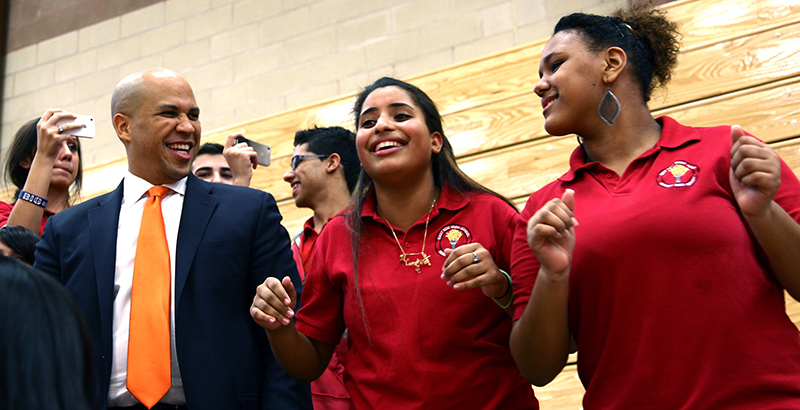EDlection 2020: With Cory Booker Running for President, 5 Insights Into His Education Record in Newark

Get the latest updates on Sen. Booker’s presidential push, as well as our complete EDlection 2020 coverage of education on the campaign trail, by signing up for The 74 Newsletter
Ever since The 74 launched in 2015, we’ve been keeping a close eye on the education reforms in Newark, New Jersey. From innovative schools to enrollment systems, student scores, and the district’s return to local control, we’ve covered Newark’s education system more than that of just about any other city.
With Sen. Cory Booker now officially running for president, we’re dusting off some of our key Newark articles and essays from the archive, to provide details and context surrounding Mayor Booker’s education legacy. Also now live on the site, an exclusive interview with the senator conducted in 2018 in which he went deeper than ever before on his education philosophy, his views on teacher quality, and why he thinks many people have misconceptions surrounding the long-term success of his school reform efforts. You can read that full interview here.
Beyond that conversation, here are five other valuable reads to better understand Booker’s education priorities while the 36th mayor of Newark:
1. From 2017: “New research shows that driving students to better schools was biggest gain from $100 million Newark school reform.” In the first substantial study of results from the ambitious package of reforms implemented in the years that followed the announcement of Mark Zuckerberg’s donation, a team of researchers led by Tom Kane, a Harvard economist who has produced influential research on teacher quality, studied fourth-to-eighth-grade student performance in the district as the reforms rolled out between 2011 and 2016. Among the findings: Students in both traditional and charter schools made larger gains in English in 2016 than in 2011; math gains were flat. Nearly two-thirds of the gains derived from more students moving to better schools — “enrollment shares following school effectiveness,” as Kane put it in an interview — largely because their low-performing schools closed or they enrolled in a charter. Read the full piece.
2. From 2015: “The Unwritten Appendix to ‘The Prize,’ By Those Inside Newark’s Improving Schools.” Dale Russakoff’s “The Prize” is an unsparing chronicle of five controversial years in Newark that began in front of a cheering audience on Oprah and ended in 2015 with the resignation of Newark Superintendent Cami Anderson. It is an important, thoughtful, and well-researched book, containing meaningful lessons for anyone with even a passing interest in cities, politics, or education. I echo Conor Williams’s sentiment that “If you read Russakoff’s account and find your beliefs vindicated, you’re not trying hard enough.”
But even if you are trying, what you might miss in “The Prize” is that the past five years have brought real educational gains to Newark students — from a student achievement perspective, Newark’s reforms were anything but a misguided failure. Read the full analysis.
3. From 2016: “Impressive new scores for Newark charters raise an awkward question: Did city pick the wrong strategy?” If you Google these three words — Zuckerberg, Newark, and failure — you’ll discover scores of now-familiar articles: Philanthropist Mark Zuckerberg kicks in $100 million to rescue Newark schools, politicians and school leaders make fools of themselves, and the entire venture floats to the surface as a bloated failure. But a steady drip of recent data points to a very different story line: Not only did the reforms of traditional Newark Public Schools produce some real benefits, but the relatively small portion of the gift invested in Newark charter schools paid off big. Real big. The gains are so striking, in fact, that they raise a key question: Why didn’t the Newark reforms emphasize charters from the beginning? If you look across the Hudson River, where former New York City schools chancellor Joel Klein produced striking gains by pulling in the region’s top charters with offers of $1-a-year rentals to use existing buildings, it’s reasonable to ask (with the admitted benefit of hindsight): Why didn’t Newark do the same? Read the full analysis.
4. From 2018: “Cory Booker could have run away from school reform. Instead, he’s doubling down on Newark’s education revival. That’s a smart move.” Booker, to all appearances, is focused on a 2020 presidential run, but one can detect no pivot from his progressive roots in school choice and equity that marked his mayoral tenure in Newark. Unlike Hillary Clinton, who went from charter school fan (“I favor promoting choice among public schools, much as the President’s Charter Schools Initiative encourages”) to charter opponent (“most charter schools, they don’t take the hardest-to-teach kids”) in order to win endorsements, Booker isn’t cowering to special interests. Instead, he’s doubling down on his reform credentials, as well as attempting a reset of the distorted narrative of Newark Public Schools. Read the full essay.
5. From 2017: “Assessing 22 years of state control as Newark votes for the board to take back reins of city schools.” There’s an old saying that when you hit bottom, the only place left to go is up. Those depths aptly describe Newark’s old school system. A 1993 Comprehensive Compliance Investigation described the district as a miasma of “low student test scores, high dropout rates, questionable expenditures of public funds, and crumbling buildings with health and safety hazards.” That year, one out of every two Newark students didn’t graduate from high school, and average SAT scores were 311 in verbal and 363 in math. What lessons can we glean from the metamorphosis from what Judge Stephen G. Weiss called an “abysmal” school district to one imbued with rising student outcomes and newly empowered parents? And how will the newly configured school board balance parent demand for continued improvement with the district’s fiscal and infrastructural instability? Read the full analysis.
Get the latest updates on Sen. Booker’s presidential push, breaking news of Newark’s schools, as well as our complete EDlection2020 coverage of education on the campaign trail, by signing up for The 74 Newsletter.
Get stories like these delivered straight to your inbox. Sign up for The 74 Newsletter

;)
